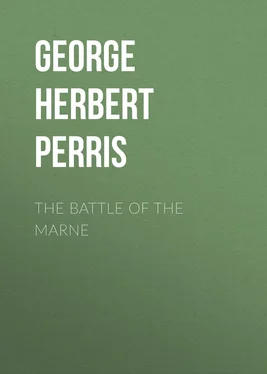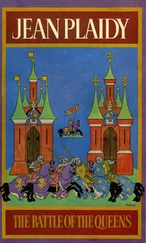George Herbert Perris - The Battle of the Marne
Здесь есть возможность читать онлайн «George Herbert Perris - The Battle of the Marne» — ознакомительный отрывок электронной книги совершенно бесплатно, а после прочтения отрывка купить полную версию. В некоторых случаях можно слушать аудио, скачать через торрент в формате fb2 и присутствует краткое содержание. Жанр: foreign_prose, foreign_antique, на английском языке. Описание произведения, (предисловие) а так же отзывы посетителей доступны на портале библиотеки ЛибКат.
- Название:The Battle of the Marne
- Автор:
- Жанр:
- Год:неизвестен
- ISBN:нет данных
- Рейтинг книги:5 / 5. Голосов: 1
-
Избранное:Добавить в избранное
- Отзывы:
-
Ваша оценка:
- 100
- 1
- 2
- 3
- 4
- 5
The Battle of the Marne: краткое содержание, описание и аннотация
Предлагаем к чтению аннотацию, описание, краткое содержание или предисловие (зависит от того, что написал сам автор книги «The Battle of the Marne»). Если вы не нашли необходимую информацию о книге — напишите в комментариях, мы постараемся отыскать её.
The Battle of the Marne — читать онлайн ознакомительный отрывок
Ниже представлен текст книги, разбитый по страницам. Система сохранения места последней прочитанной страницы, позволяет с удобством читать онлайн бесплатно книгу «The Battle of the Marne», без необходимости каждый раз заново искать на чём Вы остановились. Поставьте закладку, и сможете в любой момент перейти на страницу, на которой закончили чтение.
Интервал:
Закладка:
It was everywhere the same bitter story of defeat—defeat by surprise, by locally superior numbers, by superior armament, sometimes by superior generalship; and everywhere the retreat was accompanied and hampered by the flight of masses of peasantry and townsfolk whose flaming homes lit upon the horizon behind a warning to hasten their feeble steps.
Before we seek the Staffs in their shifting quarters, to explain this extraordinary situation, let us see what it meant for the commonalty of the armies, without whose strength and confidence the best plans must be as chaff in the wind. Over a million strong, they had left their homes, and gathered at their depots during these three weeks, to be whirled off to the frontiers and the first scarcely imaginable trial of modern conscript systems. It was a new thing in the world’s history, this sudden tremendous clash of the whole manhood of highly developed nations, armed with the most murderous machinery science could devise, and supported by vast reserves of wealth. It had fallen swiftly upon them, the doom that many learned men had declared to be impossible in the twentieth century; yet its essential nature was crude enough to be immediately understood, and the intelligence of France, though shocked, was not stunned. This million of peasants and workmen, merchants, manufacturers, priests, artists, idlers, and the nation behind them, were unanimous as never before. They knew the issue was not of their making; they knew equally that it could not be refused, but must be fought out, and that it would be a hard fight. The Napoleonic wars were to be eclipsed; and there was now no Little Corporal to flash his genius like a searchlight across Europe. The enemy had no less advantage in prestige than in effectives, preparation, initiative.
Few of the million guessed, as yet, that most of them were marked down for sacrifice. The general opinion was that it would be all over by Christmas, at latest. A four months’ war seemed tragic enough in those first days. With the unwonted agreement, an unwonted gravity spread across the sunny lands from the Channel to the Alps where the crops were ripening. If international idealism lay shattered, national democracy rose well to the trial—never better. No recrimination (even the murderer of Jaurès was set aside), no conspiracy, no guillotine, marked the great revival of the republican spirit. England would at least guard the coasts, and keep the seaways open. France went into the struggle without wavering or doubt.
And so, “Aux armes, Citoyens!”—for these, mark you, are, in very fact, citizen armies, independent, free-thinking, high-spirited fellows, no Emperor’s “cannon-food.” From the smallest hamlet to the boulevards of the great city, every pulse of life is feverishly concentrated upon their gathering and departure. At the barracks the reservists, clad, armed, equipped, are ready to entrain. Crowds of women, whose red eyes belie their brave words, children at their skirts, surround the gates, and run forward with bunches of flowers and tricolor rosettes. The officers carry bouquets at their saddle-bows, the men cap their rifles with roses and ribbons. At the railway station, long lines of goods-vans, with a few passenger carriages; more flowers and little flags; allied colours in front of the engine; a wag chalks up the direction: “ Berlin, aller et retour. ” The horses and guns are aboard; the men jostle in the open doorways, and exchange cries with the crowd. A stanza of the “Marseillaise” is broken by last adieux, shouts of “Vive la France!” and the curtain falls upon the first memorable act.
Interminable journeys follow, by road and rail, toward the frontiers, then from town to village, and from farm to farm of countrysides more and more deserted and desolate. In the passes of the Vosges, the hills and flats of Lorraine, the woods of the French Ardennes, the men accustom themselves uneasily to the oppressive heat of day and the chill and damp of night; to sore feet and chafed shoulders; to spells of hunger due to late or lost convoys; to the deprivation of accustomed comfort, and the thousand minor ills which in all times have been the ground-stuff of the showy tapestries of war. Superfluous graces of civilised life vanish before the irreconcilable need of economy in every effort. Officers begin to be honoured not for rank or show, but for the solid talents of leadership; pals are chosen, not from effusion of heart, but for assurance of help in emergency.
The mantles of the chasseurs are still blue, the breeches of the infantry red, the uniforms of the artillery and engineers nearly black; but already bright colours tend to disappear, and every other tone to assimilate with the dust of the high roads. By day and night there is but one traffic throughout these northern and eastern departments—files of cavalry, batteries of field-guns, columns of heavy-laden men, convoys of Parisian autobuses and hooded carts, pass incessantly through the silent forests out into the open plains. The civilian population steadily diminishes, even in the larger towns; the gendarmerie keep those who remain under suspicion of espionage. The frontier villagers welcome the marching troops hospitably, until local food supplies are exhausted, and until news comes in from the front of reverses and of foul cruelty to the peasants on the part of the enemy. Only a fortnight has gone by when the national confidence in a speedy victory receives this heavy blow. Bad news gathers and reverberates. It is a little difficult, after years of bloodshed, to recover the fresh sense of these first calamities. Men were then not yet broken to the pains, the abominable spectacles, of war. That their self-offering to the fatherland should win them an honoured grave might well be. But defeat at the outset, the shame of retreat almost before a blow could be struck, this was an incredible, monstrous, intolerable thing.
The incredible, however, generalised itself over all the highways of Lorraine and Belgium. Take any typical scene on the march-routes of August 22 or the following days. 1The roads are black with columns of troops retreating west- and south-ward, more or less broken, linesmen, chasseurs, artillerymen, supply and special services, with their guns, munition wagons, Red Cross detachments, convoys of heavy-laden carts with wounded men sitting on top or clinging behind; and, in the breaks, crowds of panic-stricken peasants, in farm wagons or on foot, old men, women, and children, with bedding, boxes, bird-cages, and other strange belongings. Dismay broods like a palpable cloud over these pitiful processions. There is an incessant jostling. Drivers flog their horses cruelly. Wounded men drop by the wayside and lie there untended, their haggard faces stained with mire and powder, blood oozing through their coats, trickling out into the litter of torn knapsacks and broken arms. The sun blazes inexorably, the air is poisoned with clouds of dust, or drenching showers of rain produce another sort of misery; and ever the long stream of failure and fear flows on, eddying here and there into acute confusion as some half-mad woman sets up a cry: “The Prussians!”
Night follows day: soldiers and country-folk, hungry and exhausted, fall into the corners of any sheltered place they can find—an empty barn, the nave of a village church—for an unsatisfying sleep, or, too sick to sleep, watch the fantastic shadows and fugitive lights dancing upon the walls, mocking their anguished thoughts of the morrow. The batteries and convoys have gone on through the darkness, men rolling from side to side with fatigue on their horses or gun-carriages, as though drunk. With daybreak the greater trek recommences. The enemy has not been idle: in the distance behind rolls the thunder of heavy guns; pillars of smoke and flame rise from burning villages. And as, day after day, a new stage of retirement—increasingly controlled, it is true—is ordered, the question pierces deeper: What is to become of France?
Читать дальшеИнтервал:
Закладка:
Похожие книги на «The Battle of the Marne»
Представляем Вашему вниманию похожие книги на «The Battle of the Marne» списком для выбора. Мы отобрали схожую по названию и смыслу литературу в надежде предоставить читателям больше вариантов отыскать новые, интересные, ещё непрочитанные произведения.
Обсуждение, отзывы о книге «The Battle of the Marne» и просто собственные мнения читателей. Оставьте ваши комментарии, напишите, что Вы думаете о произведении, его смысле или главных героях. Укажите что конкретно понравилось, а что нет, и почему Вы так считаете.










